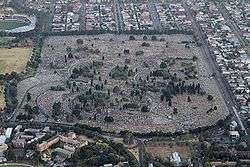Melbourne General Cemetery
|
Aerial view of Melbourne General Cemetery, looking north. | |
| Details | |
|---|---|
| Established | 1852 |
| Location | Carlton North, Victoria |
| Country | Australia |
| Size | 43 hectares (110 acres) |
| Website | Melbourne General Cemetery (Southern Metropolitan Cemeteries Trust) |
| Find a Grave | Melbourne General Cemetery |
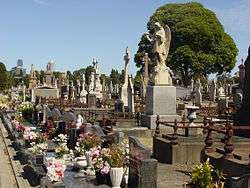
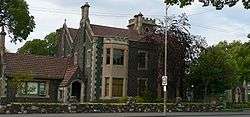
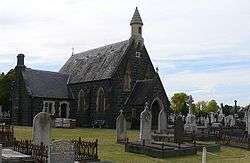
The Melbourne General Cemetery is a large (43 hectare) necropolis located 2 km (1.2 mi) north of the city of Melbourne in the suburb of Carlton North.
History
The cemetery was established in 1852 and opened on 1 June 1853, and the Old Melbourne Cemetery (on the site of what is now the Queen Victoria Market) was closed the next year.
Architecture
The grounds feature several heritage buildings, many in bluestone, including a couple of chapels and a number of cast iron pavilions. The gatehouses are particularly notable.
Burials
The tomb of famous Australian explorers Robert O'Hara Burke and William John Wills (see Burke and Wills expedition) is also located in the cemetery, with an inscription reading "Comrades in a great achievement and companions in death."[1]
Also buried here is Sir Isaac Isaacs, the first Australian-born Governor General and John Pascoe Fawkner, one of the founders of Melbourne.
Peter Lalor leader of the Eureka Stockade was buried there in 1889.
Walter Lindrum, a prodigious billiards player, has a distinctive tombstone in the shape of a billiard table.
Boxing champion "Gentleman Jack" John Reid McGowan is buried in the northern Roman Catholic section.
Patrick Hannan, who was the discoverer of gold at Kalgoorlie in Western Australia has a memorial in the northern part of the Cemetery.
Sir Redmond Barry, the Acting Chief Justice who sentenced Ned Kelly to hang and was instrumental in the foundation of the Royal Melbourne Hospital (1848), the University of Melbourne (1853), and the State Library of Victoria (1854) is also buried in the northern part of the Cemetery.
Dr John Singleton and his family are buried in Church of England Section Q Grave 229. Dr Singleton (1808-1891) was a physician, philanthropist, evangelical Christian and social reformer, whose lifetime's achievements included the establishment of the Royal Children's Hospital, the Collingwood Free Medical Mission Dispensary (now North Yarra Community Health and re-located to Hoddle Street), the Singleton Housing Equity Fund (now Housing Choices Australia), Melbourne Citymission, the Salvation Army in Victoria, and the Society for the Promotion of Public Morality, which led to the formation of the RSPCA, and dozens of "temperance" societies, among other notable charities and causes. Despite his enormous contribution to the founding of Melbourne, and to medicine, social welfare and philanthropy in Victoria, Dr Singleton remains relatively unknown.[2] In June 2012, a visit to his gravesite revealed that his tombstone had fallen over, and the site had fallen into serious disrepair.
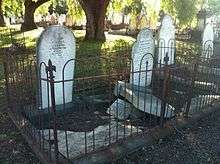
Mendel Balberyszski a noted Jewish community leader and the biographer of the destruction of the Vilna Ghetto in Lithuania. The British opera singer Frederick Federici who created the title role in The Mikado in New York in 1885 is buried in the cemetery.[3]
Prime Ministers Garden
Four Prime Ministers of Australia are memorialised at Melbourne General Cemetery. Three have headstones in the cemetery's 'Prime Ministers Garden': Sir Robert Menzies (including Dame Pattie Menzies), Harold Holt and Sir John Gorton.[4] Holt's stone is a memorial as his body was never recovered after he disappeared at sea.
James Scullin is buried in the general section of the cemetery.
War graves
The cemetery contains the war graves of 91 Commonwealth service personnel, more than 30 from World War I and more than 50 from World War II.[5]
References
- ↑ Phoenix, Dave (2011). Following Burke and Wills across Victoria : a touring guide. Phoenix. ISBN 978-0-646-56419-7.
- ↑ Otzen, Roslyn. "Dr John Singleton 1808-1891". Melbourne Citymission, 2008, pp 30-34. http://trove.nla.gov.au/work/25160752?versionId=44558358
- ↑ Federici on the Melbourne General Cemetery website
- ↑ http://www.findagrave.com/cgi-bin/fg.cgi?page=gr&GRid=8535779| Retrieved 2010-2-20
- ↑ MELBOURNE GENERAL CEMETERY, CARLTON CWGC Cemetery Report.
External links
- The Southern Metropolitan Cemeteries Trust: administrators of the Melbourne General Cemetery
| Wikimedia Commons has media related to Melbourne General Cemetery. |
Coordinates: 37°47′20″S 144°57′55″E / 37.78889°S 144.96528°E
